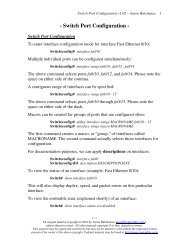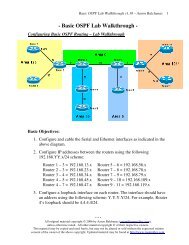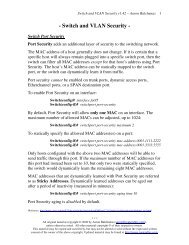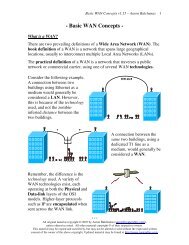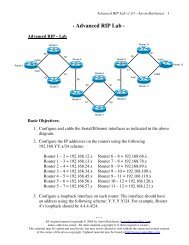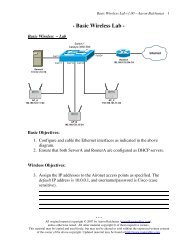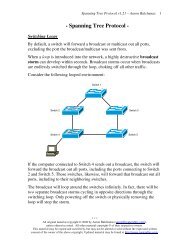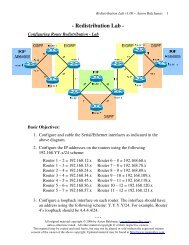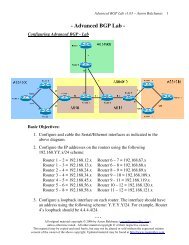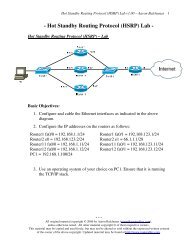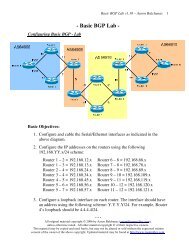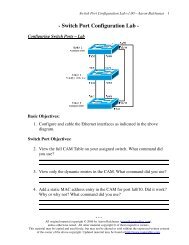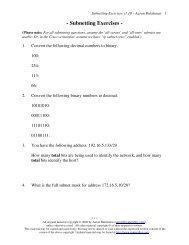- Page 1 and 2:
CCNA Study Guide v2.62 - Aaron Balc
- Page 3 and 4:
CCNA Study Guide v2.62 - Aaron Balc
- Page 5 and 6:
CCNA Study Guide v2.62 - Aaron Balc
- Page 7 and 8:
CCNA Study Guide v2.62 - Aaron Balc
- Page 9 and 10:
CCNA Study Guide v2.62 - Aaron Balc
- Page 11 and 12:
CCNA Study Guide v2.62 - Aaron Balc
- Page 13 and 14:
CCNA Study Guide v2.62 - Aaron Balc
- Page 15 and 16:
CCNA Study Guide v2.62 - Aaron Balc
- Page 17 and 18:
CCNA Study Guide v2.62 - Aaron Balc
- Page 19 and 20:
CCNA Study Guide v2.62 - Aaron Balc
- Page 21 and 22:
CCNA Study Guide v2.62 - Aaron Balc
- Page 23 and 24:
CCNA Study Guide v2.62 - Aaron Balc
- Page 25 and 26:
CCNA Study Guide v2.62 - Aaron Balc
- Page 27 and 28:
CCNA Study Guide v2.62 - Aaron Balc
- Page 29 and 30:
CCNA Study Guide v2.62 - Aaron Balc
- Page 31 and 32:
CCNA Study Guide v2.62 - Aaron Balc
- Page 33 and 34:
CCNA Study Guide v2.62 - Aaron Balc
- Page 35 and 36:
CCNA Study Guide v2.62 - Aaron Balc
- Page 37 and 38:
CCNA Study Guide v2.62 - Aaron Balc
- Page 39 and 40:
CCNA Study Guide v2.62 - Aaron Balc
- Page 41 and 42:
CCNA Study Guide v2.62 - Aaron Balc
- Page 43 and 44:
CCNA Study Guide v2.62 - Aaron Balc
- Page 45 and 46:
CCNA Study Guide v2.62 - Aaron Balc
- Page 47 and 48:
CCNA Study Guide v2.62 - Aaron Balc
- Page 49 and 50:
CCNA Study Guide v2.62 - Aaron Balc
- Page 51 and 52:
CCNA Study Guide v2.62 - Aaron Balc
- Page 53 and 54:
CCNA Study Guide v2.62 - Aaron Balc
- Page 55 and 56:
CCNA Study Guide v2.62 - Aaron Balc
- Page 57 and 58:
CCNA Study Guide v2.62 - Aaron Balc
- Page 59 and 60:
CCNA Study Guide v2.62 - Aaron Balc
- Page 61 and 62:
CCNA Study Guide v2.62 - Aaron Balc
- Page 63 and 64:
CCNA Study Guide v2.62 - Aaron Balc
- Page 65 and 66:
CCNA Study Guide v2.62 - Aaron Balc
- Page 67 and 68:
CCNA Study Guide v2.62 - Aaron Balc
- Page 69 and 70:
CCNA Study Guide v2.62 - Aaron Balc
- Page 71 and 72:
CCNA Study Guide v2.62 - Aaron Balc
- Page 73 and 74:
CCNA Study Guide v2.62 - Aaron Balc
- Page 75:
CCNA Study Guide v2.62 - Aaron Balc
- Page 78 and 79:
CCNA Study Guide v2.62 - Aaron Balc
- Page 80 and 81:
CCNA Study Guide v2.62 - Aaron Balc
- Page 82 and 83:
CCNA Study Guide v2.62 - Aaron Balc
- Page 84 and 85:
CCNA Study Guide v2.62 - Aaron Balc
- Page 86 and 87:
CCNA Study Guide v2.62 - Aaron Balc
- Page 88 and 89:
CCNA Study Guide v2.62 - Aaron Balc
- Page 90 and 91:
CCNA Study Guide v2.62 - Aaron Balc
- Page 92 and 93:
CCNA Study Guide v2.62 - Aaron Balc
- Page 94 and 95:
CCNA Study Guide v2.62 - Aaron Balc
- Page 96 and 97:
CCNA Study Guide v2.62 - Aaron Balc
- Page 98 and 99:
CCNA Study Guide v2.62 - Aaron Balc
- Page 100 and 101:
CCNA Study Guide v2.62 - Aaron Balc
- Page 102 and 103:
CCNA Study Guide v2.62 - Aaron Balc
- Page 104 and 105:
CCNA Study Guide v2.62 - Aaron Balc
- Page 106 and 107:
CCNA Study Guide v2.62 - Aaron Balc
- Page 108 and 109:
CCNA Study Guide v2.62 - Aaron Balc
- Page 110 and 111:
CCNA Study Guide v2.62 - Aaron Balc
- Page 112 and 113:
CCNA Study Guide v2.62 - Aaron Balc
- Page 114 and 115:
CCNA Study Guide v2.62 - Aaron Balc
- Page 116 and 117:
CCNA Study Guide v2.62 - Aaron Balc
- Page 118 and 119:
CCNA Study Guide v2.62 - Aaron Balc
- Page 120 and 121:
CCNA Study Guide v2.62 - Aaron Balc
- Page 122 and 123:
CCNA Study Guide v2.62 - Aaron Balc
- Page 124 and 125:
CCNA Study Guide v2.62 - Aaron Balc
- Page 126 and 127:
CCNA Study Guide v2.62 - Aaron Balc
- Page 128 and 129:
CCNA Study Guide v2.62 - Aaron Balc
- Page 130 and 131:
CCNA Study Guide v2.62 - Aaron Balc
- Page 132 and 133:
CCNA Study Guide v2.62 - Aaron Balc
- Page 134 and 135:
CCNA Study Guide v2.62 - Aaron Balc
- Page 136 and 137:
CCNA Study Guide v2.62 - Aaron Balc
- Page 138 and 139:
CCNA Study Guide v2.62 - Aaron Balc
- Page 140 and 141:
CCNA Study Guide v2.62 - Aaron Balc
- Page 142 and 143:
CCNA Study Guide v2.62 - Aaron Balc
- Page 144 and 145:
CCNA Study Guide v2.62 - Aaron Balc
- Page 146 and 147:
CCNA Study Guide v2.62 - Aaron Balc
- Page 148 and 149:
CCNA Study Guide v2.62 - Aaron Balc
- Page 150 and 151:
CCNA Study Guide v2.62 - Aaron Balc
- Page 152 and 153:
CCNA Study Guide v2.62 - Aaron Balc
- Page 154 and 155:
CCNA Study Guide v2.62 - Aaron Balc
- Page 156 and 157:
CCNA Study Guide v2.62 - Aaron Balc
- Page 158 and 159:
CCNA Study Guide v2.62 - Aaron Balc
- Page 160 and 161:
CCNA Study Guide v2.62 - Aaron Balc
- Page 162 and 163:
CCNA Study Guide v2.62 - Aaron Balc
- Page 164 and 165:
CCNA Study Guide v2.62 - Aaron Balc
- Page 166 and 167:
CCNA Study Guide v2.62 - Aaron Balc
- Page 168 and 169:
CCNA Study Guide v2.62 - Aaron Balc
- Page 170 and 171:
CCNA Study Guide v2.62 - Aaron Balc
- Page 172 and 173:
CCNA Study Guide v2.62 - Aaron Balc
- Page 174 and 175:
CCNA Study Guide v2.62 - Aaron Balc
- Page 176 and 177: CCNA Study Guide v2.62 - Aaron Balc
- Page 178 and 179: CCNA Study Guide v2.62 - Aaron Balc
- Page 180 and 181: CCNA Study Guide v2.62 - Aaron Balc
- Page 182 and 183: CCNA Study Guide v2.62 - Aaron Balc
- Page 184 and 185: CCNA Study Guide v2.62 - Aaron Balc
- Page 186 and 187: CCNA Study Guide v2.62 - Aaron Balc
- Page 188 and 189: CCNA Study Guide v2.62 - Aaron Balc
- Page 190 and 191: CCNA Study Guide v2.62 - Aaron Balc
- Page 192 and 193: CCNA Study Guide v2.62 - Aaron Balc
- Page 194 and 195: CCNA Study Guide v2.62 - Aaron Balc
- Page 196 and 197: CCNA Study Guide v2.62 - Aaron Balc
- Page 198 and 199: CCNA Study Guide v2.62 - Aaron Balc
- Page 200 and 201: CCNA Study Guide v2.62 - Aaron Balc
- Page 202 and 203: CCNA Study Guide v2.62 - Aaron Balc
- Page 204 and 205: CCNA Study Guide v2.62 - Aaron Balc
- Page 206 and 207: CCNA Study Guide v2.62 - Aaron Balc
- Page 208 and 209: CCNA Study Guide v2.62 - Aaron Balc
- Page 210 and 211: CCNA Study Guide v2.62 - Aaron Balc
- Page 212 and 213: CCNA Study Guide v2.62 - Aaron Balc
- Page 214 and 215: CCNA Study Guide v2.62 - Aaron Balc
- Page 216 and 217: CCNA Study Guide v2.62 - Aaron Balc
- Page 218 and 219: CCNA Study Guide v2.62 - Aaron Balc
- Page 220 and 221: CCNA Study Guide v2.62 - Aaron Balc
- Page 222 and 223: CCNA Study Guide v2.62 - Aaron Balc
- Page 224 and 225: CCNA Study Guide v2.62 - Aaron Balc
- Page 228 and 229: CCNA Study Guide v2.62 - Aaron Balc
- Page 230 and 231: CCNA Study Guide v2.62 - Aaron Balc
- Page 232 and 233: CCNA Study Guide v2.62 - Aaron Balc
- Page 234 and 235: CCNA Study Guide v2.62 - Aaron Balc
- Page 236 and 237: CCNA Study Guide v2.62 - Aaron Balc
- Page 238 and 239: CCNA Study Guide v2.62 - Aaron Balc
- Page 240 and 241: CCNA Study Guide v2.62 - Aaron Balc
- Page 242 and 243: CCNA Study Guide v2.62 - Aaron Balc
- Page 244 and 245: CCNA Study Guide v2.62 - Aaron Balc
- Page 246 and 247: CCNA Study Guide v2.62 - Aaron Balc
- Page 248 and 249: CCNA Study Guide v2.62 - Aaron Balc
- Page 250 and 251: CCNA Study Guide v2.62 - Aaron Balc
- Page 252 and 253: CCNA Study Guide v2.62 - Aaron Balc
- Page 254 and 255: CCNA Study Guide v2.62 - Aaron Balc
- Page 256 and 257: CCNA Study Guide v2.62 - Aaron Balc
- Page 258 and 259: CCNA Study Guide v2.62 - Aaron Balc
- Page 260 and 261: CCNA Study Guide v2.62 - Aaron Balc
- Page 262 and 263: CCNA Study Guide v2.62 - Aaron Balc
- Page 264 and 265: CCNA Study Guide v2.62 - Aaron Balc
- Page 266 and 267: CCNA Study Guide v2.62 - Aaron Balc
- Page 268 and 269: CCNA Study Guide v2.62 - Aaron Balc
- Page 270 and 271: CCNA Study Guide v2.62 - Aaron Balc
- Page 272 and 273: CCNA Study Guide v2.62 - Aaron Balc
- Page 274 and 275: CCNA Study Guide v2.62 - Aaron Balc
- Page 276 and 277:
CCNA Study Guide v2.62 - Aaron Balc
- Page 278 and 279:
CCNA Study Guide v2.62 - Aaron Balc
- Page 280 and 281:
CCNA Study Guide v2.62 - Aaron Balc
- Page 282 and 283:
CCNA Study Guide v2.62 - Aaron Balc
- Page 284 and 285:
CCNA Study Guide v2.62 - Aaron Balc
- Page 286 and 287:
CCNA Study Guide v2.62 - Aaron Balc
- Page 288 and 289:
CCNA Study Guide v2.62 - Aaron Balc
- Page 290 and 291:
CCNA Study Guide v2.62 - Aaron Balc
- Page 292 and 293:
CCNA Study Guide v2.62 - Aaron Balc
- Page 294 and 295:
CCNA Study Guide v2.62 - Aaron Balc
- Page 296 and 297:
CCNA Study Guide v2.62 - Aaron Balc
- Page 298 and 299:
CCNA Study Guide v2.62 - Aaron Balc
- Page 300 and 301:
CCNA Study Guide v2.62 - Aaron Balc
- Page 302 and 303:
CCNA Study Guide v2.62 - Aaron Balc
- Page 304:
CCNA Study Guide v2.62 - Aaron Balc



